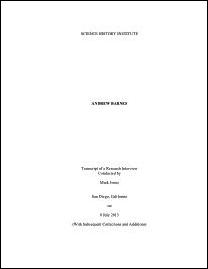Research Interview with Cam Garner
- 2012-Mar-19
Research Interview with Cam Garner
- 2012-Mar-19
Cam Garner grew up in Virginia Beach, Virginia. His father was diagnosed with cancer when Garner was a child, and later died when he was seventeen years old. Garner struggled academically in grade school, though became more adjusted in his college years. His interest in studying science began while he was attending junior college. He decided to pursue a double major in chemistry and biology at Virginia Wesleyan University, commuting from home to save money. He later attended medical school for his PhD in genetics, but did not want to wait years to finish his degree. Instead, he left his PhD program and decided to pursue a career in business, first working for Gilford Instruments in Oberlin, Ohio. There, he managed the full product line and handled development responsibilities. Gilford was later purchased by Corning Glass Works and Garner moved his family to Corning, New York. At Corning, Garner worked in management positions until he was contacted by a headhunter representing Hybridtech in California. While he first turned down the interview, he reconnected with the headhunter and joined Hybridtech in 1983. While at the company, Garner oversaw the research, development, and launch of products such as PSA [prostate specific antigen] and the pregnancy testing device ICON. Hybridtech was purchased by Eli Lilly and Company in 1986, after which Garner was offered a position as a general manager of their Canadian pharmaceutical branch.
Not wanting to move abroad, Garner left and began looking at local biotechnology companies in California. He met with Syntro, a company that made viral vaccines for animals. He came in as the company’s president, eventually rising to the role of CEO after the original CEO, Tom Parmeter, left. Garner was originally brought in to assess the company’s strategy and potential to cross over to human health products. He worked for Syntro for two years and eventually sold the company’s veterinary products to Solvay. Garner was then contacted by a board member of Dura Pharmaceuticals, who wanted to acquire an allergy product from Immunetech. Garner joined Dura and began developing the allergy product, though it never got FDA approval. Instead, Garner shifted the company’s focus. Rather than raising money for more clinical trials, Dura acquired smaller products from other companies and marketed them. The company went public in February of 1992 and continued their strategy of buying and launching branded generics, a strategy other companies began to follow.
| Property | Value |
|---|---|
| Interviewee | |
| Interviewer | |
| Place of interview | |
| Format | |
| Genre | |
| Extent |
|
| Language | |
| Rights | Creative Commons Attribution-NonCommercial-NoDerivatives 4.0 International License |
| Credit line |
|
About the Interviewer
Mark Jones holds a PhD in history, philosophy, and social studies of science from the University of California, San Diego. He is the former director of research at the Life Sciences Foundation and executive editor of LSF Magazine. He has served in numerous academic posts, and is completing the definitive account of the origins of the biotechnology industry, entitled Translating Life, for Harvard University Press.
Institutional location
| Department | |
|---|---|
| Collection | |
| Oral history number | 0158 |
Related Items
Cite as
See our FAQ page to learn how to cite an oral history.
Complete transcript of interview
garner_c_0158_final_frf.pdf
The published version of the transcript may diverge from the interview audio due to edits to the transcript made by staff of the Center for Oral History, often at the request of the interviewee, during the transcript review process.









